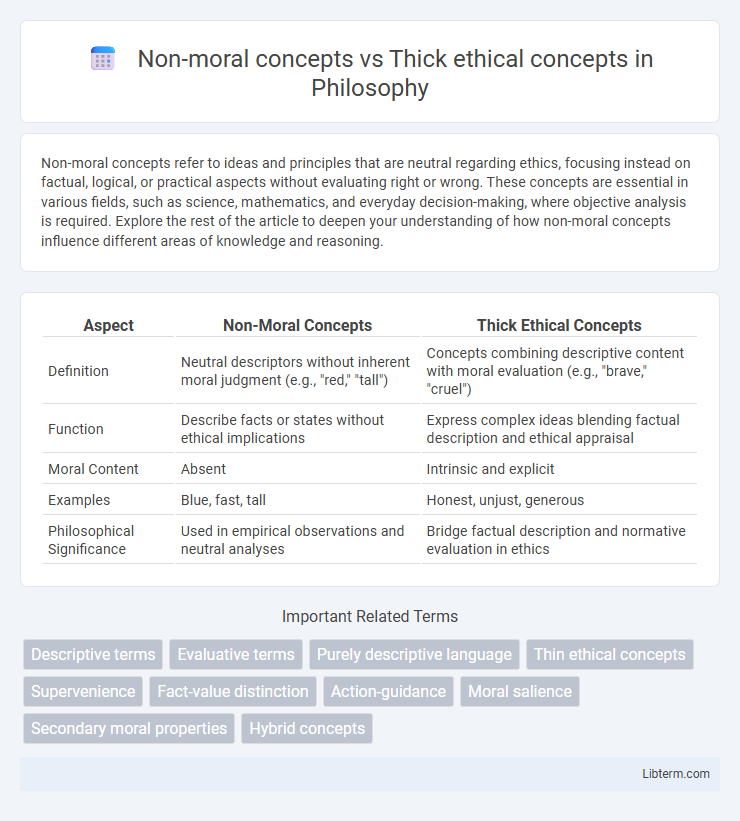Non-moral concepts refer to ideas and principles that are neutral regarding ethics, focusing instead on factual, logical, or practical aspects without evaluating right or wrong. These concepts are essential in various fields, such as science, mathematics, and everyday decision-making, where objective analysis is required. Explore the rest of the article to deepen your understanding of how non-moral concepts influence different areas of knowledge and reasoning.
Table of Comparison
| Aspect | Non-Moral Concepts | Thick Ethical Concepts |
|---|---|---|
| Definition | Neutral descriptors without inherent moral judgment (e.g., "red," "tall") | Concepts combining descriptive content with moral evaluation (e.g., "brave," "cruel") |
| Function | Describe facts or states without ethical implications | Express complex ideas blending factual description and ethical appraisal |
| Moral Content | Absent | Intrinsic and explicit |
| Examples | Blue, fast, tall | Honest, unjust, generous |
| Philosophical Significance | Used in empirical observations and neutral analyses | Bridge factual description and normative evaluation in ethics |
Introduction to Non-Moral and Thick Ethical Concepts
Non-moral concepts refer to terms and ideas that describe actions or states without implying ethical judgments, serving purely descriptive or factual purposes. Thick ethical concepts combine descriptive elements with evaluative dimensions, inherently carrying moral significance while offering insight into the characteristics of actions or attitudes. Understanding the distinction between non-moral and thick ethical concepts is crucial for analyzing how language conveys both factual information and ethical evaluation in philosophical discourse.
Defining Non-Moral Concepts
Non-moral concepts refer to ideas or terms that do not inherently involve ethical judgments or values, such as "shape," "distance," or "color." These concepts describe objective features of the world without implying what is right or wrong. In contrast, thick ethical concepts combine descriptive and evaluative content, embodying both factual and moral dimensions, like "courage" or "cruelty.
What Are Thick Ethical Concepts?
Thick ethical concepts combine descriptive content with evaluative significance, representing qualities that are morally charged and inform ethical judgments, such as "courageous" or "cruel." Unlike non-moral concepts, which describe facts without moral implications, thick ethical concepts inherently integrate value-laden assessments within their meaning. These concepts bridge the gap between factual understanding and moral evaluation, playing a crucial role in ethical reasoning and discourse.
Key Differences between Non-Moral and Thick Ethical Concepts
Non-moral concepts refer to terms devoid of evaluative or ethical content, focusing solely on descriptive or factual aspects, such as "round" or "red." Thick ethical concepts combine descriptive and normative elements, involving both factual content and ethical evaluation, like "cruel" or "courageous." The key difference lies in thick ethical concepts carrying inherent moral judgement, while non-moral concepts remain value-neutral and purely descriptive.
Examples of Non-Moral Concepts
Non-moral concepts such as "red," "large," and "round" describe observable characteristics without any ethical implications or evaluative judgments. These concepts strictly pertain to factual descriptions like "boiling point" or "distance," which lack inherent moral content. Unlike thick ethical concepts that combine descriptive and evaluative elements, non-moral concepts remain neutral and objective in nature.
Common Thick Ethical Concepts in Philosophy
Common thick ethical concepts in philosophy, such as honesty, courage, and justice, intertwine descriptive and evaluative aspects by conveying both factual content and moral significance. These concepts provide a nuanced understanding of human behavior by embedding ethical judgments within everyday language. Philosophers analyze thick ethical concepts to bridge the gap between objective descriptions and normative evaluations in moral discourse.
The Role of Value in Thick Ethical Concepts
Thick ethical concepts integrate descriptive content with evaluative function, embodying the role of value by directly linking factual properties to moral significance. Unlike non-moral concepts, which lack inherent value judgments, thick ethical concepts simultaneously convey empirical information and moral appraisal, reinforcing their unique role in ethical discourse. This fusion of facts and values allows thick ethical concepts to enrich moral reasoning by embedding normative meaning within everyday language.
Importance of Context in Interpreting Concepts
Non-moral concepts maintain consistent meanings regardless of situational variations, making their interpretation largely context-independent. Thick ethical concepts, such as "courageous" or "cruel," intrinsically combine descriptive and evaluative elements, requiring careful consideration of contextual nuances to fully grasp their moral significance. Understanding the importance of context is crucial for accurately interpreting thick ethical concepts, as their ethical weight shifts based on situational factors that non-moral concepts typically do not depend on.
Implications for Ethical Theory and Moral Debate
Non-moral concepts, lacking inherent evaluative content, provide descriptive frameworks that enhance clarity but do not influence moral judgment, while thick ethical concepts inherently integrate descriptive and evaluative dimensions, enriching ethical discourse with nuanced assessments. This dual nature of thick ethical concepts challenges ethical theory by complicating the distinction between facts and values, thereby affecting the formulation of moral principles and the interpretation of moral language. In moral debate, the interplay between these concepts influences argumentative strategies, as thick concepts invoke shared cultural understandings that can either bridge consensus or entrench disagreements over moral evaluations.
Conclusion: Bridging Non-Moral and Thick Ethical Perspectives
Bridging non-moral concepts with thick ethical concepts enhances moral discourse by integrating descriptive and evaluative dimensions, fostering a nuanced understanding of human behavior and values. This synthesis allows ethical analysis to account for context-specific details while maintaining normative rigor. Emphasizing the interplay between factual descriptions and moral evaluations enriches philosophical inquiry and practical decision-making.
Non-moral concepts Infographic

 libterm.com
libterm.com